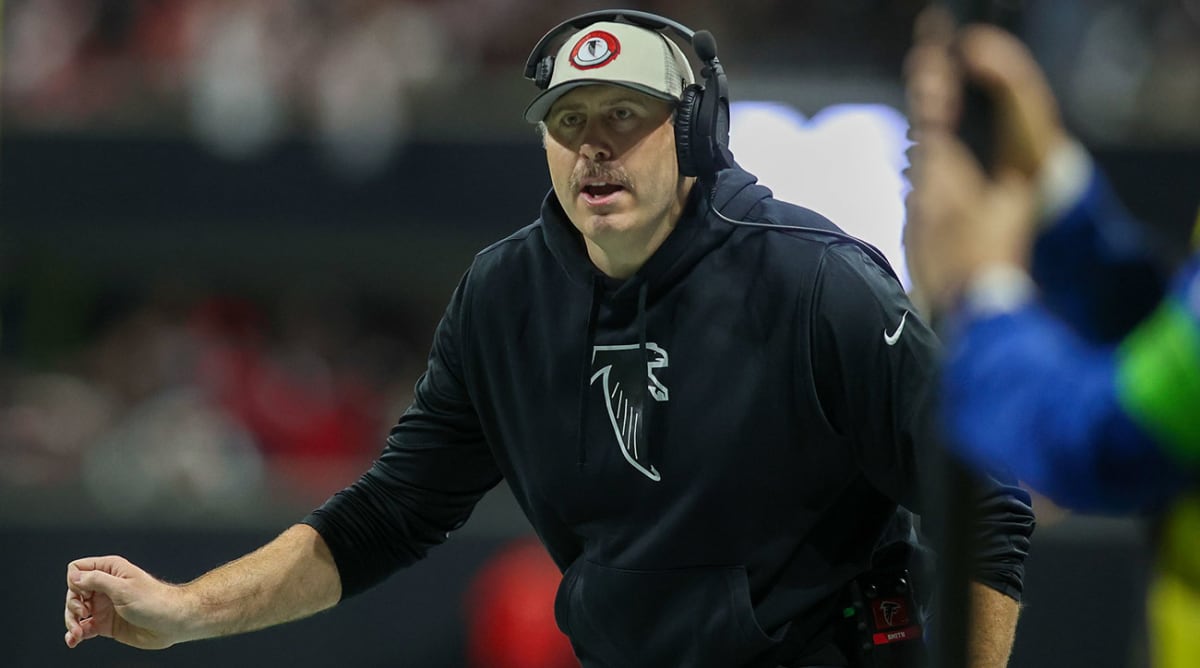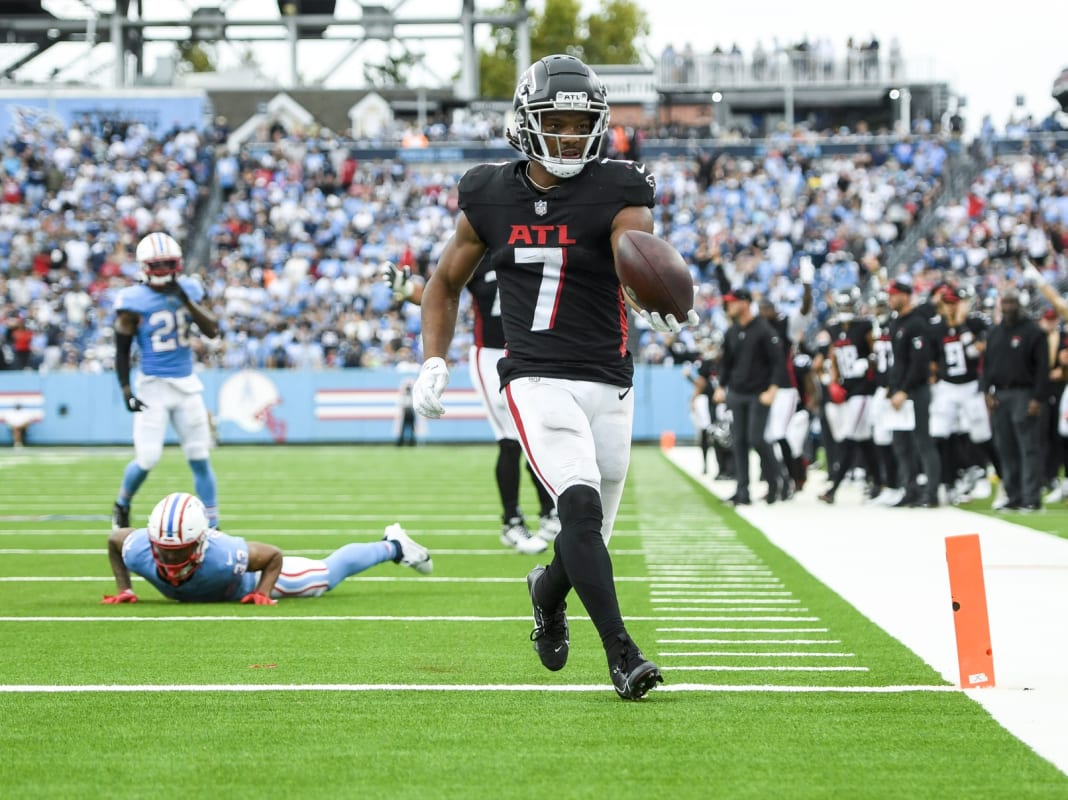It was somewhat amusing to see heads turning this week in regard to Arthur Smith’s status as coach of the Atlanta Falcons. It was reported before this weekend (as was my understanding) that Smith was likely to come back, barring some sort of season-ending collapse. When the Falcons fell to the Chicago Bears, many people looked up to see whether the sky was falling.
But this feels like as good a time as any to pause and take a breath. First, to note how ridiculous it would be to change one’s mind about keeping or firing a head coach based on a two-game sample size that didn’t include a Dolphins-Broncos style point spread (which, even in Week 3, wasn’t indicative of either team in 2023). Second, to note that Smith’s progress to this point has been significant when we consider both the parameters by which he entered the job, and what he has managed to get out of his young core of playmakers while clearly hamstrung at the quarterback position.

Brett Davis/USA TODAY Sports
Smith was hired back in 2021, which was the last season of the Matt Ryan era in Atlanta. Ryan was clearly a declining player who logged his last Pro Bowl five years earlier. In almost every season since, Ryan had seen a dip in most major markers of down-to-down success, with his adjusted yards gained per pass attempt (a metric meant to create a net average per drop-back that includes losses due to interception) cutting nearly in half from Atlanta’s infamous Super Bowl run in his MVP season of ’16.
Outside of Kyle Pitts, who posted the second-most receiving yards for a tight end in his rookie season, behind only Mike Ditka, the team was heavily reliant on aging players such as Cordarrelle Patterson, Wayne Gallman and Mike Davis (Calvin Ridley played just five games that season and stepped away due to mental health concerns, and was later suspended for the entirety of the 2022 season due to gambling).
In Smith’s second season, the year most franchises would try to pivot more toward a coach’s personnel tastes and invest, the Falcons incurred the largest dead-cap hit in NFL history upon trading Ryan. The dead cap for the Julio Jones trade also tolled, along with the dead cap from the release of Dante Fowler, which led to more than $60 million in unusable space. In what should have been a gap year, with only Pitts, and rookies Tyler Allgeier and Drake London, Atlanta managed to win seven games with a combination of Marcus Mariota and Desmond Ridder under center. The team’s point differential sliced from a minus-146 to a minus-21.
Watch the Falcons with Fubo. Start your free trial today.
This year has been something of a disappointment, though, again, the primary option at quarterback was Ridder. Even still, the Falcons have a chance to finish the season with a positive point differential and, the team—again, with Ridder at quarterback—has had six games with more than 400 yards of total offense (and a win over the Saints in which the Falcons missed that mark by just four yards).
Here’s the number of 400-yard games some of the best offenses in the NFL have had this year.
• 49ers: 10
• Lions: 7
• Dolphins: 6
• Ravens: 6
• Cowboys: 5
• Eagles: 5
• Bills: 4
• Chiefs: 3
The Falcons are 17th in net yards per passing attempt, which is in the neighborhood of the Packers, Saints and Jaguars, despite having a quarterback who, for the hundredth time, not to belabor the point, is nowhere near the level of Jordan Love, Derek Carr or Trevor Lawrence. They have a better third-down conversion rate than the Browns, Seahawks, Broncos, Jaguars, Bengals, Steelers, Saints or Colts.
As I mentioned above with Pitts, who nearly broke the rookie tight end receiving record, Smith does seem to be getting the ball to his playmakers. Bijan Robinson will likely eclipse 1,000 yards this season and holds a lead over Jahmyr Gibbs for the rookie rushing title.

Steve Roberts/USA TODAY Sports
Here’s how London, a 2022 first-round draft pick, has stacked up in terms of how many times he’s been targeted and how many times he’s actually possessed the ball over his first two seasons, compared to how two other Falcons started their careers.
London: 218 targets, 137 receptions
Jones: 223 targets, 133 receptions
Ridley: 185 targets, 127 receptions
This is a long way of asking: What more did the Falcons really expect?
If the Falcons opt not to give Smith a shot with a real quarterback, then it would seem entirely contradictory to the large investment they made in him initially. Smith, at a time of his hiring, signed a six-year contract. The length, which was not necessarily commensurate with other first-time head coaching hires around that time (post Matt Rhule, owners were temporarily reticent to offer that long of a contract without a track record of success, though DeMeco Ryans has since elevated that number back up to a standard for high-level first-time candidates), would seem to have been an acknowledgment of some difficult times ahead. To me, it reads: Develop the core while we wade through the swamp.
The Falcons have a top-10 pick in the upcoming draft (based on the current order), two third-round picks that could be used to maneuver up the board or to pair for a departing veteran such as Justin Fields, and what will probably amount to roughly $40 million in cap space. Smith has gotten them to the point where anyone else would consider this a good job should it open. So, Smith should deserve the first crack at it.
Next year, Atlanta will finally be ready to compete on a reasonable scale. Smith has the team on the somewhat distant brink of contention (needing the Panthers to beat the Buccaneers this weekend for a chance to still capture the NFC South with a below-.500 record) despite some less than reasonable circumstances.







